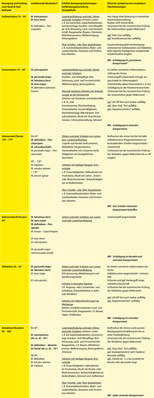Zusammenfassung
Arbeits(un)fähigkeitsfeststellungen oder auch Beantragungen von Wiedereingliederungshilfen erfordern nachvollziehbare Begründungen. Darzulegen ist, ob es sich um krankheitsbedingte Beeinträchtigungen handelt (z.B. Probleme mit der Kontaktfähigkeit bei sozialer Phobie), diese zu quantifizieren und zu erläutern, in welchem Maße sie mit Arbeitsanforderungen in Konflikt geraten (z.B. nicht ganztags Kundengespräche durchführen können, es besteht Unterstützungsnotwendigkeit durch eine Kollegin), und wie ein leidensgerechter Arbeitsplatz aussehen könnte (z.B. die extrovertierte Kollegin macht die Kundengespräche, der Patient macht Telefondienst und Buchhaltung). Seit der Entwicklung des Fremdratings zur Beschreibung von Fähigkeitsbeeinträchtigungen Mini-ICF-APP (Linden, Baron und Muschalla, 2009) hat sich dieses Instrument in der Praxis der sozialmedizinischen Begutachtung verbreitet. Die 13 psychischen Fähigkeitsdimensionen dienen in diesem Sinne als eine Art Gliederungsmatrix für einen (Arbeits- und Leistungs-)Fähigkeitsbefund. Im Unterschied zum psychopathologischen Befund sind Fähigkeiten/Beeinträchtigungen immer nur in Bezug zu einem konkreten Kontext quantifizierbar: Jemand ist nicht „un/fähig“ per se, sondern immer nur „un/fähig zu etwas“.
Das Mini-ICF-APP wird in sozialmedizinischen Leitlinien empfohlen. Das Instrument ist als Selbstratingversion und für weitergehende sozialrechtlich relevante Fragestellungen weiterentwickelt worden: selbständige Wohnfähigkeit, fähigkeitsorientierte Arbeitsplatzbeschreibung für die Herstellung passender Arbeitsplätze im Sinne des Arbeitsschutzgesetzes.
Schlüsselwörter Arbeitsunfähigkeit – Begutachtung – psychische Erkrankungen – Leistungsfähigkeit – ICF – Mini-ICF-APP
MedSach 116 4/2020: 170-182
The Mini-ICF-APP family: External and self-assessment of capacities, capacity-oriented description of work and ability to live independently
Abstract
Certifications of (in)capacity for work and applications for rehabilitation assistance require acceptable justification. It must be stated whether the impairments are illness-related (e.g. problems with interaction in the case of social phobia) and this must be quantified. It must be explained to what extent these impairments come into conflict with the requirements of work (e.g. inability to talk with customers all day without support from a colleague) and how a workplace designed to accommodate health conditions might look (e.g. the extrovert colleague talks to customers, the patient deals with phone calls and bookkeeping).
The Mini-ICF-APP (Linden, Baron and Muschalla, 2009), an observer-rating instrument for the description of capacity impairments, has been used widely among practitioners of socio-medical assessment since it was developed. The Mini-ICF-APP covers 13 capacity dimensions which serve as a kind of coding matrix for (work) capacity findings. Unlike psychopathological findings, capacities/impairments can often only be quantified in relation to an actual context. No one is “(in)capable” per se, but only ever “(in)capable of something”.
The Mini-ICF-APP is recommended in social-medicine guidelines. The instrument has been further developed as a self-rating version and for ongoing questions of relevance to social law: the ability to live independently, capacity-oriented description of work for the adjustment of workplaces as per the German Occupational Safety and Health Act.
Keywords Incapacity for work – expert assessment – mental disorders – capacity – ICF – Mini-ICF-APP
Anschrift der Verfasserin
Prof. Dr. Beate Muschalla
Psychologische Psychotherapeutin
Technische Universität Braunschweig
Institut für Psychologie
Abteilung Klinische Psychologie, Psychotherapie und Diagnostik
Humboldtstraße 33
38106 Braunschweig




